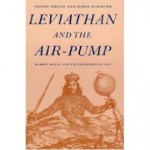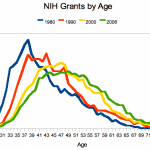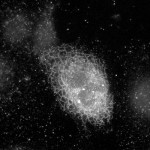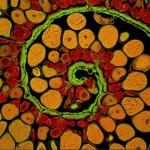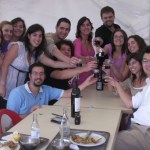lab life
Youll have to forgive me, folks. Im in the midst of writing a paper (*insert excited Peter Griffin gasp here*-- there are lots of open access virology journals, but I cant promise it).
Writing this paper has reminded me of a luxury we have in scientific research: we can be wrong.
Its bad when a physician or nurse is wrong, giving the wrong diagnosis or a wrong drug.
Its bad when a truck driver is wrong, delivering the wrong thing to the wrong place under the wrong shipping conditions.
Its bad when a teacher is wrong, mixing up a battle date or equation or artist (I hated when my teachers/…
Two great interviews with Steven Shapin and Simon Schaffer, two philosophers of science.
CBC Ideas - Interview with Simon Schaffer on Leviathan and the Air Pump
CBC Ideas - Interview with Steven Shapin on how science and truth are derived from social interactions within the scientific community
If you like these interviews, visit CBC Ideas - How to think about science although I must say that some shows are better than others.
Also for anyone who is interested in the history and philosophy of science and is ready to go beyond Kuhn and Popper, I highly recommend Leviathan and the Air Pump.…
The graph is from Are there too many PhDs? at Mendeley Blog
In the U.S., we are constantly hearing about how the country is falling behind in science. We need more scientists to fill all of those jobs we want to create. And the cure to that is to fund more PhD programs! Yet, when you ask graduate students and postdoctoral scholars what their individual experiences are, a science career is a very tough road with low pay and few career prospects. It's such a tough path that an entire PhD comic strip was born to alleviate the situation with laughter. Why then, is there such a disconnect?
HT:…
Last week was demo week here at the Palazzo lab. Both Zeiss and Nikon dropped off their latest equipment and we had the chance to image some RNA. In addition we finally completed some badly needed lab renovations and as a result had an operation tissue culture area. I went ahead and transfected COS7 cells with a plasmid that we just received from Open Biosystems that contains a gene of interest (a membrane bound protein whose RNA did not contain an SSCR, for those keeping track) and tried out a new FISH probe. Of course we were missing forceps and those great porcelain coverslip racks from…
After a frantic couple of weeks, the lab seems to be finally coming together. This afternoon I sat down and started to peruse the past few issues of Cell Science, Nature, JCB, PLoS etc. and a few of the blogs that I like to check out.
And then I read this strange article in the latest issue of Science: A SMART Plan for New Investigators
The premise is ... that the NIH should not give young investigators a break ... because they are full of crap?!?!!! As a solution the author writes:
Instead of providing special funding directly to new faculty, we should make sure that they receive…
From Study Finds Science Pipeline Strong, But Losing Top Students, Science 30 October 2009: Vol. 326. no. 5953, p. 654
A new study finds little evidence for leaks in the U.S. pipeline for producing native-born scientists except for a steep drop in the percentage of the highest performing students taking science and engineering jobs. The findings suggest that the United States risks losing its economic competitiveness not because of a work force inadequately trained in science, as conventional wisdom holds, but because of a lack of social and economic incentives to pursue careers in science…
When I was a postdoc at Harvard Medical School, I was a founding member of the New England RNA Data Club. We organized a monthly meeting, where RNA researchers from around the New England Area would get together and present data. Over three years, we were lucky enough to hear exciting talks and catalyze many new collaborations between labs at Harvard, MIT, University Massachusetts Medical School Worcester, Boston University, Brandeis and Tufts. We were fortunate enough to get speakers as far away as Yale and Darthmouth.
When I left Harvard to start my own lab in Toronto, I thought that the…
Seminar Series of the CIHR Training Grant in Protein Folding
Dr. Alexander Palazzo
Department of Biochemistry
University of Toronto
Specialized Nuclear Export of mRNA Encoding Secreted and Mitochondrial Proteins
Thursday, November 12, 2008 - 12:15pm
Medical Sciences Building, Rm. 4279
University of Toronto
I'll see you there
Well this week the University of Toronto hosts the 50th anniversary of the Gairdner Foundation.
If the Nobels are the Oscars of science, and the Lasker Awards the Golden Globes, this event is akin to the 50th anniversary of some big Hollywood studio. There are talks by many of today's hottest science rock stars and many smaller celebrations, which include lunches cocktail parties etc.
This morning we heard from Shinya Yamanaka, probably the hottest rock star scientist of our generation. If you've been asleep for the past few years, Yamanaka's lab discovered how to generate iPS cells from…
Today I used a pipette for the first time in three and a half months.
What a strange feeling it is to work in one's own lab.
While I've been submitting papers and grants, my technician has been busy preparing solutions, ordering equipment and even performing a few "experiments" (if you can call transforming bacteria tan experiment). It's almost as if we've been supplying the ship, one that's getting ready to sail off into the unknown. I was looking after the financing, while my technician stocked up the ship with supplies. We've even managed to recruit a couple of undergrads who are in the…
Go and check 'em out.
4th place - James E. Hayden, Anglerfish ovary (4X)
For more visit http://www.nikonsmallworld.com/
This year's event even got covered in the New York Times.
And if you want to enter into next year's competition the deadline for entries: April 30, 2010. Get clicking.
This weekend, I had the opportunity to sit down with a friend, a cancer surgeon who works at a major teaching hospital in the US. He, his wife and two kids were up visiting us for the weekend.
Over coffee, I was asking him about the state of cancer therapeutics. Although he himself does not administer drugs or design treatments, he is part of a larger team which includes molecular oncologists that perform this task. What I heard was quite surprising.
From the vantage point of academia, we have been told that the development of new anti-cancer chemotherapy has been a disaster (here's one…
Well this year was a big year again for RNA at the Nobels. Both prizes were essentially given to RNA dependent processes. In the case of Telomerase, an RNA molecule, Telomerase RNA (hTR or TERC), acts as the template strand to help Telomerase Reverse Transcriptase (TERT) elongate the end of the telomere. Here's a great vid explaining the whole process:
In the case of the Ribosome - well it is only the granddaddy of all ribozymes. To illustrate this point, here's a great video from the Steitz Lab with an incredible soundtrack:
(HT: Sunil)
Links to essay's on this year's Medicine &…
Unraveling the ribosome is one of science's Holy Grails. Were God a molecule, he or she would be a ribosome, a veritable galaxy of atoms whose job is to translate genetic code into the stuff of life--protein.
- Brian Maffly, reporter for the Slt Lake Tribune in a recent article, Ramakrishnan: Nobel-winning work started in Utah
(and yes the article features a good friend of mine who worked in Venki's lab)
So we got back yesterday from our trip and we are in the post-traveling cleanup mode - Cleaning up the apartment, the fridge, and the email box. In fact I just received an email from one Coimbra student filled with photos from the past week.
Below the fold are some pictures of our trip + comments about our time there.
I have to say that I really enjoy teaching. This past week I've talked about the history of our eukarytotic cells and how this informs their structure. I was going to record my lecture and post it, but it didn't happen. Maybe next time.
Speaking of ancient, the University of…
Well after a bit of a holiday, the New England RNA Data Club is back. We'll be meeting next week here at HMS. Here's the latest email:
Hello All,
The next meeting of the New England RNA Club will take place Wednesday, March 4th. We will have beverages starting at 5:30PM and talks from 6:00-7:00PM in the Cannon room at Harvard Medical School. Our speakers will be:
Daehyun Baek, Bartel Lab, Whitehead
Lidia Vasilieva, Buratowski Lab, HMS
After the talks we will have food and more beverages. If you are in need of parking, please email us back ASAP. This meeting is sponsored by MERCK, Qiagen and…
Natural human pathological variation can be readily identified by highly trained professionals, in other words doctors. Pathological variations of other model organisms are usually eaten.
- Stephen O'Rahilly, Co-Director of IMS and Director of IMS Metabolic Research Laboratories, Cambridge University UK, on the advantages of studying humans who have rare metabolic diseases.
If you have happened to browse DrugMonkey, you'll have noticed a discussion about how the NIH should spend its share of the stimulus package (~$10 billion). (For more info click here.) Unfortunately the plan, according to the NIH statement is the same usual BS - all quick fixes and no forethought about how to use this opportunity to repair some endemic problems with how we train our academic scientists. But within the cloudy depths of the comment section of DrugMonkey's PhysioProf's post, fellow Scibling Abel Pharmboy raises a key point:
In general, I'm very concerned that the pressure to…
Yesterday I and a few local PhDs had a chat with a reporter from [insert name of big newspaper here] and we started talking about the life of a gradstudent and/or postdoc in the biomedical sciences. At the end of the conversation I brought up the academic blog scene and the reporter asked for a list of blogs written by gradstudents and or postdocs. I've started to compile a list of blogs that convey the zeitgeist of life in the lower rungs of the academic ladder, but I am also soliciting your help.
What am I looking for? As an example, I'll point to Ambivalent Academic who posted an excellent…
As you know, I'll be leaving the US in the middle of the year to head up north to my native land where I'll be setting up my new lab.
Having lived in both the US and Canada, I am in a good position to evaluate both societies. My basic conclusion? America you have a lot to learn from your northern brothers and sisters. It is really frustrating being down here and listening to Americans (especially those on the right) dismiss the concept of public institutions. What do you end up with? A country that is rotting from within. Fortunately things may change for the better. Money from the upcoming…
